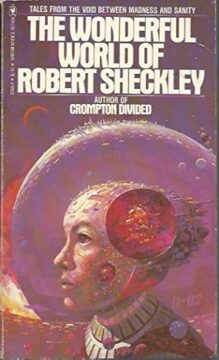Isaac Ariail Reed at The Hedgehog Review:
 On their surface, the stories in Store of the Worlds operate in new ways with an old conceit: The beings possessed of superior technology turn out to be less mature and developed in their social sensibilities and cultural commitments than their supposed inferiors on less technologically advanced planets. In Sheckley’s worlds, hyper-rationalists, religious imperialists, and wealthy suburbanites addicted to the latest gadget are given their comeuppance. But this highly typified first layer, when peeled back, reveals deeper meanings. Sheckley is interested in the human mind and its aversion to the kinds of sociality that demand conformity as a condition for the achievement of peace. His picture of the mind is psychoanalytic, though also inflected by his absurdist-influenced concerns with the human use and abuse of language and his pulpy inclinations to shock, scare, and amuse the reader.
On their surface, the stories in Store of the Worlds operate in new ways with an old conceit: The beings possessed of superior technology turn out to be less mature and developed in their social sensibilities and cultural commitments than their supposed inferiors on less technologically advanced planets. In Sheckley’s worlds, hyper-rationalists, religious imperialists, and wealthy suburbanites addicted to the latest gadget are given their comeuppance. But this highly typified first layer, when peeled back, reveals deeper meanings. Sheckley is interested in the human mind and its aversion to the kinds of sociality that demand conformity as a condition for the achievement of peace. His picture of the mind is psychoanalytic, though also inflected by his absurdist-influenced concerns with the human use and abuse of language and his pulpy inclinations to shock, scare, and amuse the reader.
In Store of the Worlds, then, we get a picture of technological civilization that still must deal with the three aspects of the soul as understood by Plato (logistikon, thymoeides, and epithymetikon: reason, spirit, and appetite), and one in which, with the wrong fantasy in place and spirit run amok, reason stands no chance.
more here.
Enjoying the content on 3QD? Help keep us going by donating now.
